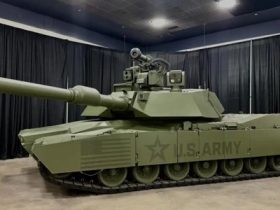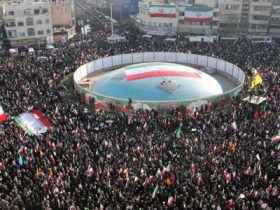The morning after President Donald Trump vowed to “start testing our Nuclear Weapons,” his pick to lead U.S. Strategic Command fielded questions from senators who wondered what the president meant and what the nominee planned to do about it.
“If confirmed in the role of the STRATCOM commander, my role would be to provide military advice, and I would look forward to working with the committee and policy members to inform the way ahead with respect to any testing, whether that’s testing of our missile systems, or maturity associated with surety” of nuclear weapons, said Vice Adm. Richard Correll, a submariner and STRATCOM’s deputy commander.
That was the gist of Correll’s testimony during his confirmation hearing Thursday as lawmakers tried to parse exactly what Trump meant when he called for immediate nuclear weapons testing “on an equal basis” via social media late on Wednesday. No one was quite sure what the president meant, but it’s been 33 years since the United States exploded a nuclear weapon.
Trump defended his position to reporters Thursday aboard Air Force One returning from a trip to Asia.
“We have more nuclear weapons than anybody. We don’t do testing. We’ve halted it years, many years ago. But with others doing testing, I think it’s appropriate that we do also,” he said.
Last year, a nuclear weapons scientist from Los Alamos National Laboratory told NPR that “our assessment is that there are no system questions that would be answered by a test, that would be worth the expense and the effort and the time.”
The president didn’t provide details on when or where testing would take place but said, “We have test sites; it’ll be announced.”
Robert Peters, a senior research fellow for strategic deterrence at the Heritage Foundation, told NPR that there was just one place where the U.S. could test a nuke: the Nevada National Security Site, about 60 miles northwest of Las Vegas.
Back on Capitol Hill, senators, mostly Democrats, looked to Correll for clear answers on how he would advise the president on explosive nuclear testing or how its resumption could influence adversaries like China and Russia.
Sen. Jack Reed, D-R.I., ranking member of the Senate Armed Services Committee, lambasted Trump’s “confusing” policy change during the hearing and in a statement, calling it a “fundamental misunderstanding of our nuclear enterprise—it is the Department of Energy, not the Department of Defense, that manages our nuclear weapons complex and any testing activities.”
“The United States would gain very little from such testing, and we would sacrifice decades of hard-won progress in preventing nuclear proliferation,” Reed said in a statement.
During the hearing, Sen. Mazie Hirono, D-Hawaii, worried such live testing would “push” nuclear power nations to test more.
“We have a Stockpile Stewardship Program to ensure the safety and reliability of our nuclear weapons without explosive testing, and the program relies on supercomputer simulations, non-explosive experiments and technology. We have a lot of technology that keeps us ahead of our adversaries in terms of ensuring that our nuclear stockpile is actually reliable,” she said.
Sen. Jacky Rosen, D-Nev., stressed the lasting effects of explosive nuclear testing.
“The Nevada Test Site, now known as the Nevada National Security Site, NNSS, was ground zero for the majority of the United States, explosive nuclear testing from 1951 to 1992…and my state of Nevada is still suffering the consequences,” Rosen said. “I will not let this happen, not on my watch. I will do everything I can in my power as a senator, as a United States citizen, to put a stop to this and protect families in my State of Nevada.”
Correll said he “wouldn’t presume to predict a response on the part of Russia or China” and as the hearing went on, vowed to provide data-informed advice on nuclear weapons testing, while also requesting classified meetings to answer senators’ concerns.
“I have always been driven by data and, to the best of my ability, provide forthright and candid advice. And I commit that that will not change going forward,” he said.
Correll also supports the Stockpile Stewardship Program, “which has developed the science and tools necessary to certify the nuclear weapons stockpile without the need for full-scale nuclear weapons testing,” according to written responses to policy questions,
Republican senators were more tempered in their questioning, supporting the president’s statement by emphasizing the need for all kinds of nuclear testing on a regular schedule.
Sen. Tim Sheehy, R-Mont., said “testing on an ‘equal basis,’ is an extremely reasonable ask of our military, and I think it’s the least we can do.”
“In general, tests of all kinds, whether nuclear or conventional, don’t just provide those benefits, but also can send a strong message of resolve and deterrence,” said Sen. Tom Cotton, R-Ark., “We saw the exact opposite effect at times during the last administration, when President Biden canceled routine tests of our Minutemen III missiles to avoid supposedly escalating tensions with China or Russia.”
When asked about maintaining a nuclear testing schedule as a means of deterrence, Correll agreed.
The STRATCOM commander role is “responsible for the requirements associated with accuracy and effectiveness of the weapons and that then drives the services and other subject matter experts, analysis of the testing required to meet those objectives,” he said. “It is a really, really important aspect of demonstrating the reliability and credibility of our nuclear deterrent, and that’s an essential attribute for deterrence…particularly in this era.”
Read the full article here








Leave a Reply